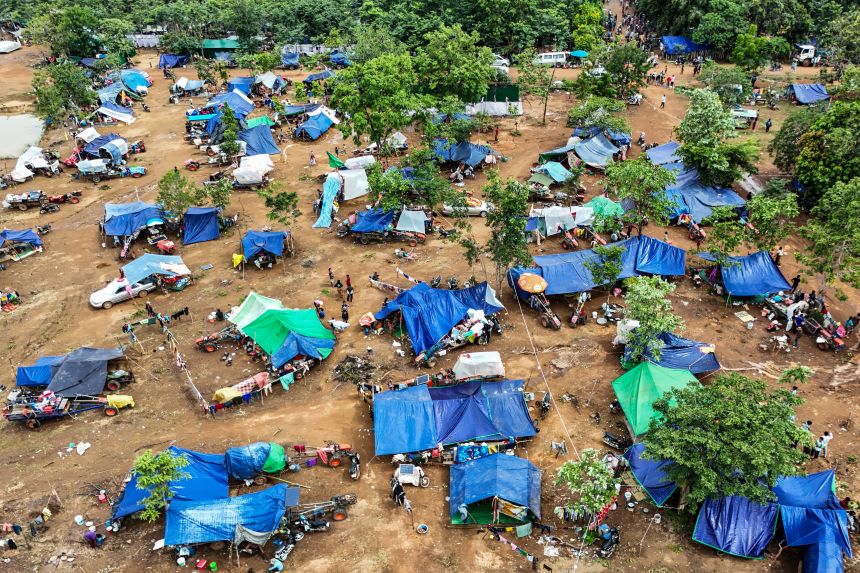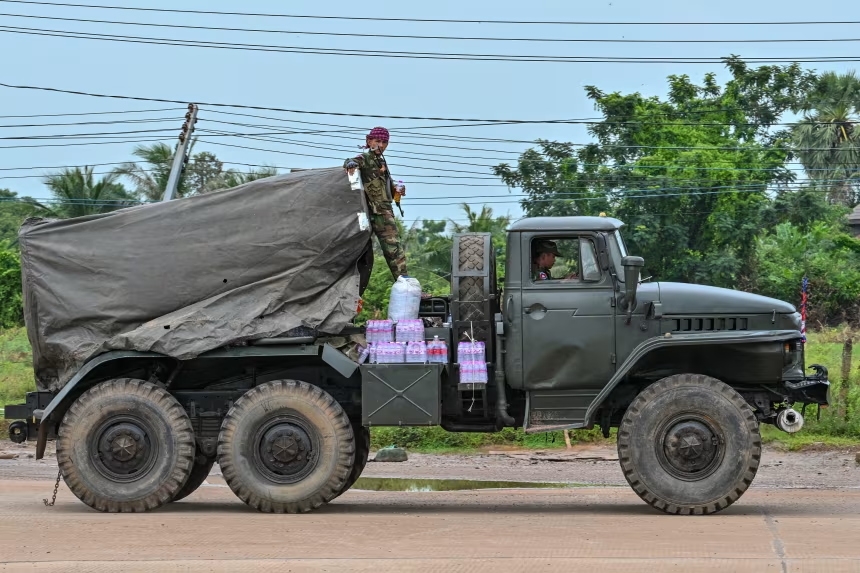Cambodia and Thailand exchanged fire across their disputed border for a fourth day on Sunday, hours after US President Donald Trump announced the two Southeast Asian nations had agreed to ceasefire talks and threatened continued fighting would jeopardize their trade deals with Washington.
At least 32 people have been killed and more than 200,000 displaced since Thursday, according to Thai and Cambodian officials, in clashes that have rumbled on despite calls from the United Nations, United States and China for the fighting to stop.
Both sides have accused the other of starting the latest border flare-up, and traded blame for the ongoing fighting.
Their leaders will meet in Malaysia on Monday afternoon to discuss the escalating conflict, according to Malaysia’s state news agency, citing the country’s foreign minister.
The Thai government confirmed that acting Prime Minister Phumtham Wechayachai will attend the meeting in Kuala Lumpur, which “is intended to listen to all proposals that could contribute to restoring peace.” Cambodian Prime Minister Hun Manet will also attend, according to Malaysia’s news agency.
“The Thai Government remains committed to defending the nation’s sovereignty and territorial integrity. Every square inch of it,” Thailand’s government spokesman Jirayu Houngsub said, adding that the country will not negotiate on which maps are used during ceasefire negotiations.
Earlier on Sunday, after Trump’s announcement, Thailand’s government said it was “not ready” to stop military operations and accused Cambodia of continuing to fire heavy artillery at civilian areas in its Surin province, on the border, and several other areas.
“Any cessation of hostilities cannot be reached” while Cambodia is “repeatedly violating the basic principles of human rights and humanitarian law,” Thailand’s Ministry of Foreign Affairs said in a statement.
Trump said he had warned the Thai and Cambodia leaders that he would not make trade deals with either country if the deadly border conflict continues.
Phumtham said Sunday that his country does not want a third country to mediate but was “thankful” for Trump’s “concern.”
“We’ve proposed a bilateral between our foreign ministers, to conclude what conditions (would be) for ceasefire and drawing back troops and long range firing weapons,” Phumtham said at a press conference, adding that “soldiers will continue to do their job at full steam” until there is no danger for civilians.
Thailand hit several locations in Cambodia with drones, tank fire, cluster and aerial bombs early Sunday morning local time, a spokesperson for Cambodia’s defense ministry told reporters.
Some of the projectiles landed near the ancient Preah Vihear temple, a UNESCO world heritage site in Cambodia’s northern province of the same name, according to Lt. Gen. Maly Socheata. The temple complex has been at the center of previous clashes between the two nations.

Cambodia slammed what it said were Thailand’s “deliberate and premeditated acts of aggression.”
Those acts “have occurred despite ongoing efforts led by President Donald Trump to seek a ceasefire, efforts that have been publicly and clearly supported by Hun Manet, Prime Minister of the Kingdom of Cambodia,” Lt. Gen. Maly Socheata said.

“Our forces are still striking back actively and are not afraid to protect the territory,” Maly Socheata said.
The state-run National Broadcasting Services of Thailand (NBT) reported that Cambodian forces had fired artillery into the Thai border province of Surin, west of Preah Vihear, damaging residential homes. Thai forces were responding, it reported.
Thailand on Sunday said 24 people have been killed since hostilities began, 14 of whom are civilians. There are more than 139,000 from seven provinces displaced and staying in government shelters, according to the Thai army.
Cambodia said Saturday that in Oddar Meanchey province, which borders Thailand’s Surin, 13 people had been killed, including eight civilians, and 50 wounded. At least 80,000 people in Cambodia have been displaced by the fighting, according to the defense ministry.

The strongman and the telecoms billionaire
Ties between Thailand and Cambodia have previously been close, thanks partly to the relationship between two former leaders – Cambodia strongman Hun Sen and Thailand’s telecoms billionaire and former prime minister Thaksin Shinawatra.
Neither man holds office, but both remain hugely influential in their respective countries.
Recent tension at border had been simmering since a clash in May, in which a Cambodian soldier was killed. Relations soured further following the release of a leaked phone call between Thai Prime Minister Paetongtarn Shinawatra – Thaksin’s daughter – and Cambodia’s Hun Sen.
In the call, Paetongtarn could be heard calling Hun Sen “uncle” and appeared to criticize her own army’s actions in the border dispute.
Paetongtarn’s comments struck a nerve in Thailand, and opponents accused her of compromising the country’s national interests. She defended her actions but was later suspended by the Constitutional Court pending an ethics review and could face dismissal.

Hun Sen has since taken to Facebook posting scathing remarks against Thaksin, accusing him of “resorting to war, the ultimate consequence of which will be the suffering of the people.”
Thaksin, in a post on X, accused Hun Sen of ordering Cambodian troops to fire into Thai territory.
Trump diplomacy
President Trump said Saturday that he had spoken with both the Cambodian Prime Minister and the acting Thai Prime Minister in his efforts to restore peace.
“They have agreed to immediately meet and quickly work out a Ceasefire and, ultimately, PEACE!” Trump wrote on Truth Social in a series of posts outlining his diplomatic efforts, but offering no details on the negotiations.
“They are also looking to get back to the “Trading Table” with the United States, which we think is inappropriate to do until such time as the fighting STOPS,” Trump wrote.
Earlier this month, Trump wrote letters to Thailand and Cambodia threatening a 36% tariff on most of their exports to the US, starting August 1. Cambodia and Thailand both delivered substantial offers to their US counterparts in an effort to move to the front of the line for a trade agreement, officials said at the time.
In the early hours of Sunday morning local time, Hun Manet thanked Trump and said that Cambodia agreed with “the proposal for an immediate and unconditional ceasefire between the two armed forces.” He added that he had previously agreed to a ceasefire proposal from Malaysian Prime Minister Anwar Ibrahim.
A statement from Thailand’s Ministry of Foreign Affairs was more measured, saying it wished to see “sincere intention from the Cambodian side” – but that Phumtham had also “requested President Trump to convey …that Thailand wants to convene a bilateral dialogue as soon as possible to bring forth measures and procedures for the ceasefire and the eventual peaceful resolution of the conflict.”
Bangkok and Phnom Penh have been fighting over territory disputed since colonial power France drew the border between them more than a century ago. The renewed deadly conflict pits longtime US ally Thailand, with decades of experience, against Cambodia’s relatively young armed force, which has close ties to China.
The United Nations has condemned the violence, with Secretary General António Guterres urging in a post on X for “both sides to immediately agree to a ceasefire and to address any issues through dialogue.”
